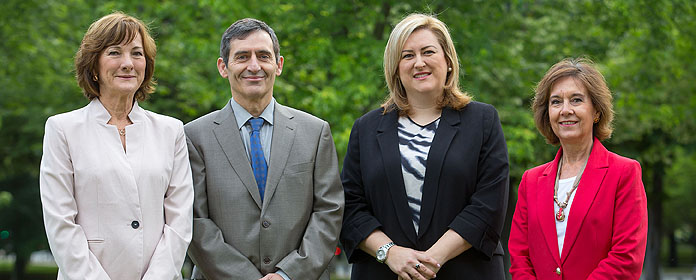19_06_14_EDU_bullying
"28% of adults acknowledge 'sequelae' of being bullied at school"
The psychologist Fuensanta Cerezo explains the keys to bullying at a workshop organized by the University.

"The effects of bullying go beyond classroom. Some 28% of adults recognize "after-effects" of having been bullied at school". This was stated by Fuensanta Cerezo, psychologist and expert on school violence, who gave the inaugural session of the workshop "Bullying: keys to understand, evaluate and intervene", organized by the University of Navarra.organized by the University of Navarra.
"These people suffer long-term effects deadline, and may have antisocial behavior, difficulties in interpersonal relationships. They are likely to be subjected to harassment at work and even have recurrent suicidal ideation," he explained.
In the short term, deadline, the expert says that 65.6% of them suffer problems of moderate severity and show sadness, nervousness, sleep disturbances, loneliness, and in more serious cases, suicidal ideation.
"To talk about bullying is to talk about intimidation, the ability to generate fear," he explains. In this sense, he stressed the importance of providing student body with strategies that allow them to protect themselves when a bullying status begins to occur. "If the victim is capable of not feeling identified, of not being affected, there will be no bullying. That is where we have to work, in the capacity of resilience".
On the other hand, it has established the characteristics of bullying and its various forms: physical, verbal, indirect or cyberbullying. He also provided variables that influence bullying, according to age, sex, social status, etc. In this way, he explained some differences between the subject bullying that "is usually common in boys, especially physical", and in girls, where "it is more indirect, through rumors".
He also emphasized that status goes beyond an aggressor and a victim: "A case can start with one colleague assaulting another and quickly move on to group, either because the rest join in directly, or because they do it indirectly, pretending that nothing is happening".
He also warned of the effects on the aggressors: "They can tend to form groups with similar profiles to their own, and in some cases even lead to situations of predelinquency". In addition, he pointed out that when they reach adulthood, this subject group of people will reinforce these behaviors.
Bullying, a social responsibilityThe workshop has continued with a roundtable with the participation of the experts Teodoro Hernandez de Frutos, sociologist and professor of the UPNA, Olatz Ormaetxea, psychologist and professor of the Master in General Health Psychology of the University of Navarra; Fuensanta Cerezoand M. Carmen Gonzalez-Torres, professor of the School of Education and Psychologyand Psychology, who was in charge of moderating the round table.
In his speech, Hernández de Frutos considered it "fundamental" to continue providing training and information on this topic and advised to deal with it (through surveys, dynamics in the classroom) always from anonymity. For his part, Ormaetxea emphasized that "tackling bullying is based on Education, on positive coexistence". And he added: "It is important that everyone becomes manager at an individual level, to then make it a social responsibility".
This workshop, which ended with a workshop on how families can deal with this problem, is part of a new edition of the conference De Centros Educativos organized by the School of Education and Psychology of the University of Navarra.

